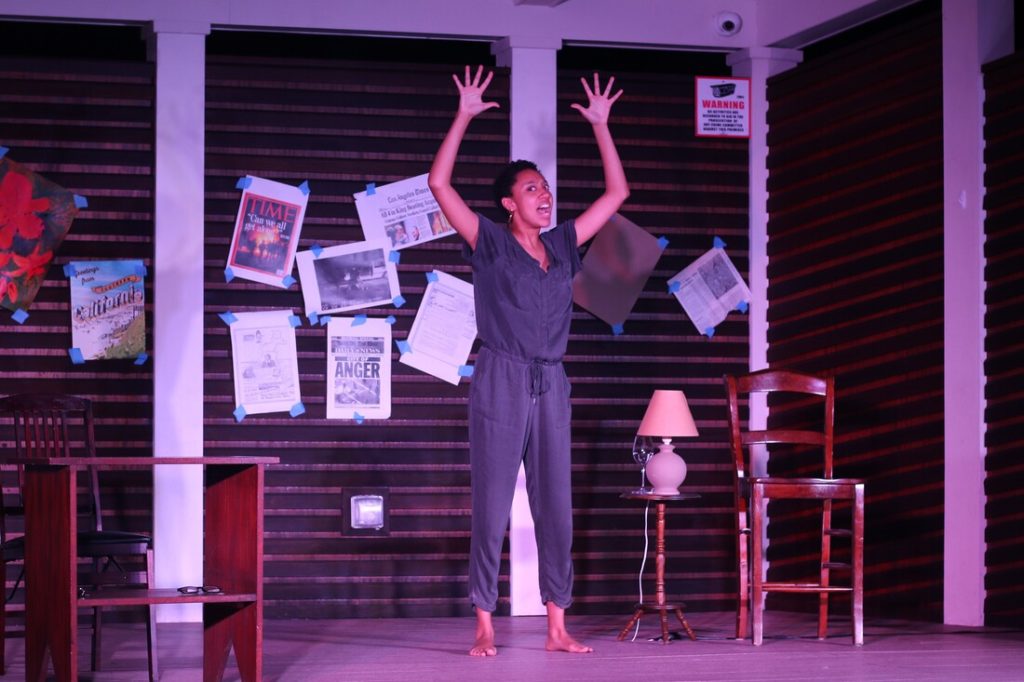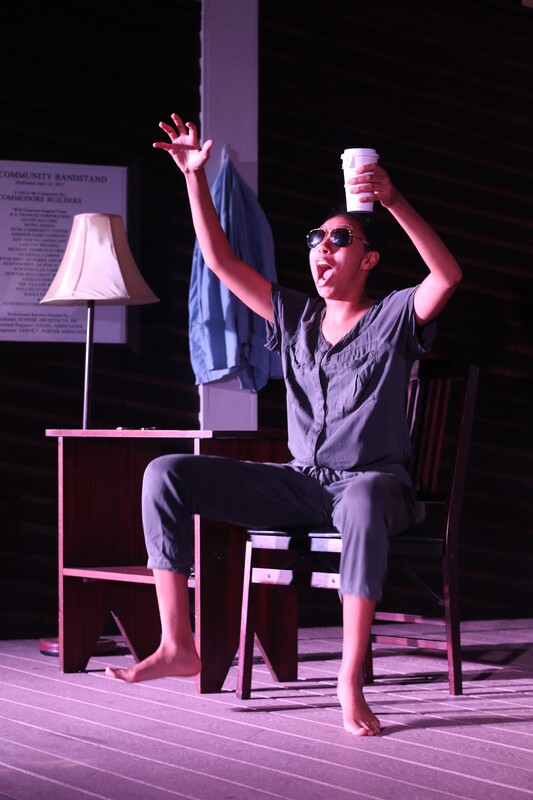
Photo via www.newtontheatrecompany.com
Presented by Newton Theatre Company
Written by Anna Deavere Smith
Directed by Rosalind Bevan
Starring Regan Sims
Online program
September 17-18, 8 PM
September 19, 2 & 8 PM
Hyde Community Bandshell
Lincoln Street, Newton Highlands
Newton Theatre Co on Facebook
Review by Afrikah Smith
NEWTON, MA ⸺ Almost three decades after its premiere, Twilight: Los Angeles, 1992 still holds truth to issues of race and class in America. Despite years after the 1992 LA riots, we are stuck in a vacuum where we have yet to include and acknowledge the context, text, and subtext of the ways in which racism and institutional systems prevail and create distance in making progress in the United States. Anna Deavere Smith’s use of verbatim theatre fights against this and creates conversation; giving a platform for those heavily affected.
Sitting outside in dark, grey weather, the atmosphere began light-hearted. Community members greeted and welcomed each other before the rain began to drizzle. Enter, Regan Sims: tall, poised, and quiet.
As she set up the space with posters of art, my first impression was of Sims creating an intimate, personal space. Not long after, newspapers and posters of the 1992 Rodney King riots are hung, and the air becomes still. As someone born in 1997, I did not know of the riots until my junior year of high school; 17 years after it had happened.
Whether intentional or not, the weather added an atmosphere of hesitancy as the show began. With scattered rain and thunderstorms in the forecast, I couldn’t help but be on the edge of my seat after seeing a flash of light in the sky.
As we revisited the past, Sims was effortless in shapeshifting into the various individuals who experienced police brutality, the Rodney King trial, and the 1992 riots; many whose accounts still resonate today. After a year of witnessing Black Lives Matter protests, the January 6th insurrection, and rising tensions we currently face, I immediately felt the paralleled emotions felt between 1992 and 2021.
Despite being confined to the small space, Sims did a great job being fluid in the portrayals and transforming into a different person right before our eyes. She used levels, dialects, and movement, outside of minimal props and costumes to diligently embody each person interviewed. Sims’ portrayal of Senator Bill Bradley was chilling. Her storytelling made Bradley’s words come to life and kept us engaged. As his last words rang in the air, Sims effortlessly became Juror #7 with a light and an energy that could not be matched.

Sims in character. Via www.newtontheatrecompany.com
The one time where I questioned Sims’ performance was when she performed as Angela King (Rodney King’s aunt). I felt a disconnect in this moment of the play. It was as if there was a block or hesitancy to express Angela King’s grief and anger after witnessing her nephew being attacked by police. It made me think too: who is the intended audience of Twilight: Los Angeles, 1992 today? How do we engage with a work like this, which is not met with only the consumption of trauma and grief, but more specifically, Black trauma and grief?
Deavere’s work offers the opportunity for artists and audience members to be educated and have a dialogue. By intersecting race, class, and privilege, what does it mean to respond and react to this work 30 years after the Rodney King riots? How do we meet the growing demand to defund the police and reallocate resources to social programs? Should critical race theory be included in school curriculums and academia? How are we all responsible for working towards a tangible future that centers marginalized and historically excluded voices?
With the many questions that follow, Twilight is a haunting reminder of ignoring the need for these cultural conversations. I wished that there was a conversation that followed the performance, especially with the many intersecting issues that have intensified since the start of the pandemic. These conversations have only remained dormant before 1992 and present day with action only taken at its peak or as a performance itself, without recognition of its weight.
Throughout the performance, I couldn’t help but notice the ambiance of the gym shoes squeaking, shouts of sports players from the community center, passing strangers, and the sounds of distant sirens. A reminder that Twilight: Los Angeles,1992 is a record of an ongoing American saga that has yet to have a resolution.
